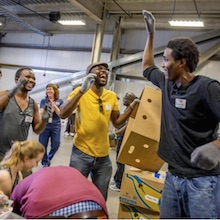Our dedication to Racial Equality and Social Justice (RESJ) spans decades. Learn more about our RESJ Initiative
Meet the students at Cambridge College charting a new future for Africa

As published in the Boston Globe, August 3, 2016
Obianuju Egbuna arrived at Cambridge College ready to learn and to network. But she also came bearing a message: “Yes, we are qualified! Yes, we are educated! Yes, we know what we are doing!”
That was how she answered Cambridge College students who were shocked to learn that Egbuna, a 30-year-old from Nigeria, has a master’s degree in business administration.
“I felt really proud because it was an opportunity for them to hear about who we are and what we are doing,” she said.
Egbuna is one of 25 Mandela Washington Fellows at Cambridge College this summer. The highly competitive program is the cornerstone of President Obama’s Young African Leaders Initiative. The six-week program seeks to provide fellows training, mentoring, and networking opportunities. Cambridge College is one of many US universities hosting a total of about 1,000fellowship recipients — many of whom are emerging leaders in their countries’ technology, education, or tourism industries. In Boston, fellows have met with local educators and entrepreneurs, attending seminars and logging volunteer hours.
To host fellows, the college had to apply with the US Department of State. Cambridge College President Deborah Jackson said she applied in an effort to broaden the school’s mission — which emphasizes diversity and equal opportunity — to a “global context.”
“It was such a good fit for us,” she said. “The college’s mission extends beyond its own borders.”
Many of the fellows, who are mostly in their 20s and 30s, have founded a startup, own their own business, or lead a non-profit, but most have faced adversity along the way.
Gisela Masika, 28, runs a school for 3- to 15-year-olds in Tanzania, and she said that women — especially young women — in managerial roles are rarely taken seriously by the country’s patriarchy.
“It’s really hard being a woman and managing a school,” Masika said. “First of all, they will undervalue you because you’re a woman. Second of all, our culture thinks that if you’re managing something, you’re disobeying your husband.”
She said the Mandela Fellowship will make her more confident and a better leader at her school. Hopefully this will trickle down to her students, she said, and they will feel empowered to subvert the traditional narrative about African countries.
“As Africans, it’s very hard for us to tell people about our successes,” Masika said. “We feel ashamed to tell people. Most of the children, they want to be like someone in America.”
Fellows from countries across Africa echoed that point: many children don’t have homegrown role models.
For 23-year-old Petronella Muzondo, the feeling was compounded. Not only did she want to be a coder — a male-dominated field — but she wanted to do it in her home country of Zimbabwe, where, she said, people don’t expect women to study computer programming.
“It’s been challenging,” Muzondo said. “People don’t believe in you. You tell them you’re a programmer and they’ll be like, ‘No, no way.’”
Muzondo, who co-founded a start-up during her sophomore year at university, said networking with Americans has been nice (she’s working with a programmer at MIT), but meeting industry leaders from her continent has been the most valuable part of the fellowship.
“As much as we are learning from the culture of the United States, the most important things that most of us will take back are the relationships that we’ve formed,” she said.
Many of the fellows are hoping this new culture of collaboration will help change the attitude of some of their countrymen who believe African businesses must be legitimized with a Western country’s stamp of approval
“In all of Africa, we have that mentality,” said Ibrahim Seini, 36. “This is an opportunity for all of us to show our skills and competence can be useful for our own people.”
This shift in mindset happened first among the fellows themselves during a group reflection, said Catherine Koverola, Cambridge College’s provost who has been heavily involved in the programming. One fellow compared other members of the group to two American icons famous for pursuing justice and equality.
“Someone said, ‘I look at Martin Luther King and I look at Obama and I realize the heroes are here,’” she said. “‘The heroes I can look to are the fellows that I’ve met.’”
The fellows are on the right track, Seini, who is from Niger, said. Many come from countries where there has been a lot of development and innovation but where many problems still exist. The first step, he said, is empowering local people.
“When the solution comes from within, we can start believing in ourselves,” he said. “We can start trusting that we can do this, we can go forward.”

